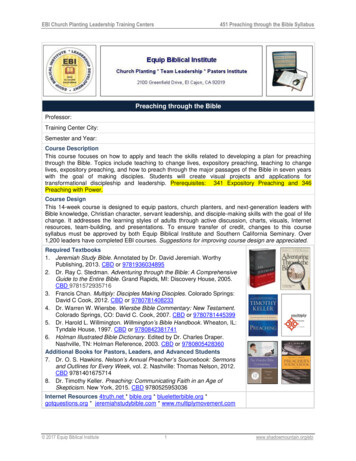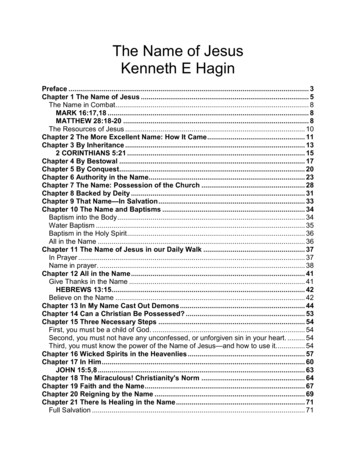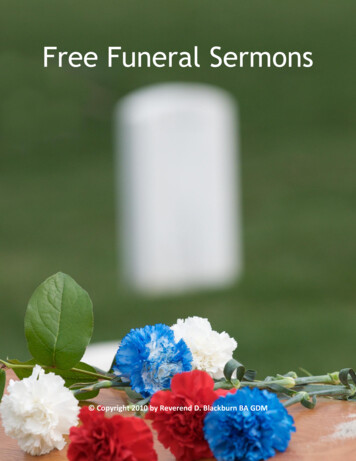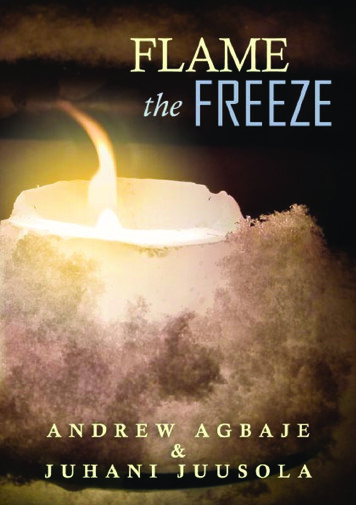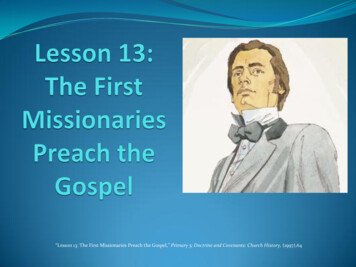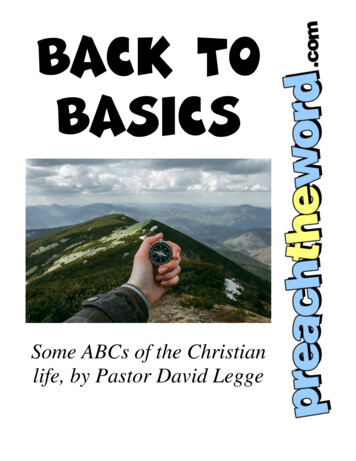
Transcription
Back ToBasicsSome ABCs of the Christianlife, by Pastor David Legge
BACK TO BASICSPastor David LeggeDavid Legge is a Christian evangelist, preacher and Bibleteacher. He served as Assistant Pastor at PortadownBaptist Church before receiving a call to the pastorate ofthe Iron Hall Assembly in Belfast, Northern Ireland. Heministered as pastor-teacher of the Iron Hall from 19982008, and now resides in Portadown with his wifeBarbara, daughter Lydia and son Noah.Contents1.2.3.4.5.6.7.8.9.10.11.12.13.14.The Morning Watch - 3The Fullness Of The Holy Spirit - 10Temptation - 18Obedience - 27Fruit - 34Guidance - 42Love For The Lord - 50Love For Others - 58Love For The Lost - 65The Church - 72Discernment - 79Assurance - 85Worship - 93Warfare - 100The audio for this series is available free of charge either on our website(www.preachtheword.com) or by request from info@preachtheword.comAll material by Pastor Legge is copyrighted. However, these materials may be freely copied and distributed unaltered for the purpose of studyand teaching, so long as they are made available to others free of charge, and the copyright is included. This does not include hosting orbroadcasting the materials on another website, however linking to the resources on preachtheword.com is permitted. These materials may not, inany manner, be sold or used to solicit "donations" from others, nor may they be included in anything you intend to copyright, sell, or offer for afee. This copyright is exercised to keep these materials freely available to all.2
BACK TO BASICSPastor David LeggeBack To Basics - Chapter 1"The Morning Watch"Copyright 2004by Pastor David LeggeAll Rights ReservedIwant you to turn with me to Psalm 5. We're beginning a new series this morning that I hope will be ahelp to us all in our Christian pilgrimage and pathway with the Lord Jesus. It's entitled 'Back to Basics',back to basics, and the subject this morning that I want to take up in the time that remains is 'TheMorning Watch', the morning watch. One verse I want to read, we'll look at quite a number of verses fromthe Scriptures, but just one verse to be a springboard for our contemplations this morning, verse 3 of Psalmnumber 5: 'My voice shalt thou hear in the morning, O LORD; in the morning will I direct my prayer untothee, and will look up'.There is a great need, I believe, in this modern church age in which we live, an age of modern technology, anage of slick programmes, an age of emphasis on professionalism, to reassess what really matters in the life ofthe church and in the life of individual believers, Christians. We need to reassess what really brings blessingto the people of God, what we really need if we're going to know true success before God - and I use thatphrase 'success' advisedly, because there is such a thing as 'true success' in the word of God, but it's notalways as we quantify it today; as numbers, as professionalism, as excellence. If we ever, as the Iron Hallhere, or as the church of Jesus Christ where He has called us to be a witness; and if we are ever, as individualChristians, going to succeed for God in a biblical sense, it is essential for us to go back to our roots andexamine where we came from, and get back to basics.I hope you understand what we're saying today. If we feel, perhaps, that in our own personal lives, and as thechurch - perish the thought - that we have lost our way, it is imperative for us to go back to basics, toexamine our roots, to go back to the first principles of Christ - if you like, the ABCs of Christian discipleship- and ask ourselves: are we still practising these things, and is it the absence of these things that are thereasons for the absence of blessing in our lives?Now this Sunday morning we're looking at 'The Morning Watch', but on other Sunday mornings we'll belooking at the Lord's table, we'll be looking at baptism, we'll be looking at witnessing and soul-winning, we'llbe looking at various things that we ought to be doing as Christians in our lives, how we face temptation andso on. We'll hopefully get back to the basics of the Christian life, and if we've never learnt them - if you'renewly saved - we'll learn them on these mornings; but if we've forgotten them, or left those old paths ofblessing, that we'll get back onto them and know God's blessing in our life once again.This morning's basic that we've got to get back to is what I've called 'The Morning Watch'. S.D. Gordon,who was a great devotional writer, wrote these words, I quote: 'A life of victory and power hinges upon threethings: one, an act; two, a purpose; three, a habit. An initial act, a fixed purpose, a daily habit'. Now thatinitial act that Gordon was talking about was the act of personal surrender to the Lord Jesus Christ, when youcome to faith in the Saviour at that hour of salvation. But then that purpose that he's talking about, a fixedpurpose, is to obey the Lord as a believer in whatever He tells us to do. So there is an initial act, there's afixed purpose, and then he talked about a daily habit. If we're to know power, vitality and success in theChristian life, we not only have that initial act of salvation, and that purpose in our minds that is fixed to3
BACK TO BASICSPastor David Leggeobey the Lord in whatever He says, but we need to have a daily habit. That daily habit is meeting with theLord, day by day.S.D. Gordon said, in summing all that he had just said up, 'After the initial act of surrender, the secret of astrong winsome Christian life is in spending time daily alone with God over His word'. Now here's thequestion: do you observe the morning watch? Early in the morning, are you found pouring over the word ofGod, praying to God and bringing your needs to Him in prayer? You might say: 'Well, that's elementary,every Christian should be engaged in such an act', and that is true - but my question to you this morning is:are you engaged in it? What an obvious mistake, you might think, for a Christian of all people to stopreading their Bible, to stop praying, to stop meeting with God in the morning - but the fact of the matter is:many of us are defeated as Christians because we do not observe this basic in the Christian life. We do notcome daily before the Lord and meet with God.The reason for many of us is that we are too busy to pray, but you know those great saints of God that weread of in the Scriptures and we read of in Christian history were not too busy to pray - in fact they were toobusy not to pray! The morning watch was such an essential thing in their lives that Watchman Nee, for oneexample, said 'No Bible, no breakfast'. 'If I get up this morning and I don't have time to read my Bible, wellthen I don't have any breakfast until I get to that place where I'm pouring over my Bible before God andbringing my prayers to the throne of grace'. Martin Luther was a very busy man, in fact he was busy with theReformation affairs in the whole of Europe, but he said these words: 'If I fail to spend' - and I'm not layingdown a specific time for any of you, but this is just what he said - 'If I fail to spend two hours in prayer eachmorning, the devil gets the victory through the day. I've so much business I cannot get on without threehours, at times, daily in prayer'. He goes on to say: 'If I should neglect prayer but a single day, I should lose agreat deal of the fire of faith'. That's what Luther said, a man who turned Europe upside down for Christ - buthere's my question to you in the light of his testimony, and the testimony of Scripture: have any of us lost thefire of faith, the vitality of our Christian lives, the power, the victory? Could it be because the morning watchis neglected?Now please note, I'm not talking this morning specifically about Bible reading. I'm not talking about praying- I've done plenty of talking about praying and Bible reading in the past. I'm not even talking about what hasbeen commonly called today 'the quiet time', which is an expression that was used in a valid sense when itwas first christened, but now I believe has got out of all control, and people think that 'the quiet time' is tojust read a portion of Scripture and get through the Bible in a year or two years or whatever, and then praythrough a list and bring your needs to God - that is not what I'm talking about. I'm talking about meeting withGod, specifically meeting with God in the morning.The necessary ingredient of a life of victory and power in the Lord Jesus Christ is a life, not reading theBible or praying, it is a life of communion with the Lord Jesus Christ that will bring you into the immediatepresence of God. It is the morning watch, it is what saints of God in bygone eras called 'the trysting time'.You might think that's rather an archaic name, and I suppose it is, because it's an old word for a time and aplace where lovers used to meet. You would arrange to meet under such-and-such a tree, or at the corner ofsuch-and-such a street with the one that you were courting. There is to be a time, and there is to be a place inall our lives - and I believe the biblical time is the morning, and I'll show you this in a moment - but there isto be that time when we meet with Jesus, the Lover of our souls, and to His bosom we fly!Is there that place? Others called it 'the still hour', 'the quiet hour', the title we take this morning is 'themorning watch'. The name is a historic one, 'the morning watch', in fact the name is a biblical one. It'sdirectly suggested by David in the verse that we read, Psalm 5 verse 3: 'O Lord, in the morning shalt thouhear my voice; in the morning will I order my prayer unto thee'. It was held through the saints of all the agesthat the morning was God's appointed time to meet Him. Murray M'Cheyne put it like this: 'I ought to pray4
BACK TO BASICSPastor David Leggebefore seeing anyone. I feel it is far better to begin with God, to see His face first, to get my soul near Himbefore it is near another'.Now is this the modern day practice of the church of Jesus Christ, and individual Christians? The morningwatch? To see the face of Jesus before we see any other face? We uphold men like David who said:'Evening, and morning, and afternoon will I pray and cry aloud and seek Your face'; we uphold the apostleswho went up to the synagogue early in the morning to pray; we uphold the Lord Jesus who was found earlyin the morning in the place of prayer; we uphold men like Murray M'Cheyne and Martin Luther - but as E.M.Bounds says on that very light: 'We build these men's tombs and write their epitaphs, but we are careful notto follow their examples!'. Do we follow their examples of the morning watch?Now please note, before I go on any further, what I'm not saying. I'm not saying that the morning is the onlytime to meet God, that is not what I'm saying. Some people, I'll not name anybody, are not morning people the fact of the matter is, they're grumpy in the morning, it takes them a couple of hours to wake up and themorning is not so conducive to them. I'm not saying that your main 'quiet time' has to always, by some ruleor regulation, be the morning. Some people work shifts, and it would be impossible almost for them to meetGod, in some sense, in the morning. Some people are ill, and they're not feeling well in the morning, and ittakes them a little time to get body and soul together before they can meet with the Lord. I'm not talkingabout those specific instances, but the principle that I'm espousing is this: we ought to begin the day withGod. Whatever our day is, however it begins, as far as it is physically, emotionally and spiritually possible,and however short that time may be - if you take your main quiet time later on in the day, I'm not saying thatyou can't do that or you shouldn't, but I am saying that we should at least, as soon as the day dawns, have atime with God - because it makes the difference.Men of God have testified that it makes the difference, and I'm not talking about legalism now - don'tmisunderstand what I'm saying. I'm not putting myself or yourself into bondage, I'm not saying you must dothis or you should do this, rather I'm saying - mark - you need this! You will perhaps even come to a place inyour life, if you begin to practice this, where you will want this - there will not be a bondage, but it will beblessing; it won't be penance, it will be a privilege to get up and lift your voice to God in the morning. Letme give you this basic in two titles: one, the morning watch is the most biblical of practices; and two, themorning watch is the most beneficial of practices.Let's take the first: it is the most biblical of practices. Now we don't have time to go into all this, let me justsay that if you were to go to Genesis 19, Abraham rose early in the morning to meet with God. In Genesis 28Jacob did the same; in Exodus 8, 9, 24 and 34 Moses did it; in Joshua 3, 6, 7 and 8 Joshua rose early in themorning; Gideon in Judges 6; Hannah in 1 Samuel 1; Samuel in 1 Samuel 15; David in 1 Samuel 17; Job inchapter 1 verse 5; the apostles in Acts 5:21; Mary in Luke 24, Mark 16, John 20 and our Lord Jesus Christ who is our supreme example and gives us the power to live like Him, in Mark chapter 1 and verse 34.Let's turn to that portion for a moment - Mark 1:34, and it says: 'He healed many that were sick of diversdiseases, and cast out many devils; and suffered not the devils to speak, because they knew him. And in themorning, rising up a great while before day, he went out, and departed into a solitary place, and there prayed.And Simon and they that were with him followed after him. And when they had found him, they said untohim, All men seek for thee'. Now just imagine the scene please, the Lord Jesus has been busy all the daybefore healing the sick, making blind eyes to see, doing mighty miraculous works before men. The crowd isaround about Him, everybody is thronging Him, everybody wants Him, they're pushing up against Him inthe press; and the nightfall comes and He goes and retires to His bed - and almost like a voice to Samuel inthe night, He hears the voice of His heavenly Father, and He arises. There is none other arisen in the house,no one else in the town is awake, and carefully He gets out of His bed and He walks on tiptoes to the door ofthat house. He lifts the latch and closes it gently, and He goes out into that same street, past the same houses5
BACK TO BASICSPastor David Leggewhere people were thronging after Him from. He goes into the countryside, and then into the fields; and Hesees a crevice, perhaps, in a rock that is nearby - and there He gets upon his knees and He faces God inheaven, and He cries to Him for power! Not another soul around Him - no one sees it - but there He is, theSon of God in the morning watch.Now this is biblical, the statement 'the morning watch' goes right back to ancient times, where city wallswere guarded. The guards would stay up all night and take shifts in order to protect the city. In the earliesttimes the morning watch was divided into three watches. There was a watch from 6pm to 10, then there wasa watch from 10 to 2, and then again there was the watch from 2 to 6am - those three watches. In Romantimes, in the days of our Lord Jesus and the disciples, the division was into four watches of the night. Thefirst watch was from 6, tea-time, 6pm through to 9pm, that was the evening watch; then there was themidnight watch which was from 9pm to 12 midnight; and then there was the cock-crowing watch frommidnight to 3am; and then there is what is called the morning watch from 3am to 6am. Now it is interestingthat in the Bible it's constantly repeated that the Lord keeps the nightly watch over His children - what am Italking about? When you're asleep and when I'm asleep, and when the children of Israel were asleep in theOld Testament, it was the Lord who would keep them during the night - He was watching over them, Psalm121: 'The LORD is thy keeper: the LORD is thy shade upon thy right hand. The sun shall not smite thee byday, nor the moon by night'. He watched over them, in fact Psalm 127 verse 1 that says: 'Except the LORDbuild the house, they labour in vain that build it', also says, 'except the LORD keep the city, the watchmanwaketh but in vain'. The word for 'keep', 'except the Lord keep the city', is the same word for 'watchmen'. Soyou could translate it like this: 'Except the Lord watches the city, what is the point in the watchmen watchingit, if the Lord is not over it?'.Why am I telling you all this? It's simply this: there was this idea in the Old Testament and, I believe, theNew Testament that the Lord was watching over His people all through the night, the watches of the night,and then out of respect and reverence for Him and devotion, out of a heart of love - before, as it were, thefinal watch was over where the Lord was taking care of them, they would rise out of their bed and come tomeet with God. Do you understand this? It's as if the Lord is saying: 'I've been watching over you all thenight while you've slept, and I wish that you would give me the refreshment of a quiet bit of talk andfellowship with you before the day begins'.Isaiah chapter 50 tells us about this, please turn with me, Isaiah chapter 50 verse 4: 'The Lord GOD hathgiven me the tongue of the learned, that I should know how to speak a word in season to him that is weary:he' - speaking of God - 'wakeneth morning by morning, he wakeneth mine ear to hear as the learned'. That isa morning appointment with God, and it is at His special request. Look who is waking us up! It is the Lordwho is waking us up in the morning. It is daily: 'he wakeneth morning by morning'. Look at the results of it:a trained ear, a trained tongue, a life of helpfulness, a life of power, a life of victory - and it's early in themorning, because the Lord has to waken us up.Let me show you another illustration of this in allegory, turn to the Song of Songs for a moment. Song ofSongs 5, I believe Song of Songs not only is a typology of the church of Jesus Christ and the Lord JesusChrist, but also an allegory of the Christian in communion with the person of the Lord Jesus - I think that isperhaps primarily what it is, the love relationship that we have with Him. Here you have the bride, as thechurch or as the individual Christian, and she says in verse 2: 'I sleep, but my heart waketh: it is the voice ofmy beloved that knocks, saying, Open to me, my sister, my love, my dove, my undefiled: for my head isfilled with dew, and my locks with the drops of the night'. So here is the Bridegroom knocking on the door,and He is damp because of the dew of the early morning, and He wants entrance into the bridal chamber. Hesays: 'I have put off my coat; how shall I put it on? I have washed my feet; how shall I defile them? Mybeloved put in his hand by the hole of the door, and my bowels were moved for him. I rose up' - but notice,she waited for a while, and then she rose up - 'to open to my beloved; and my hands dropped with myrrh, and6
BACK TO BASICSPastor David Leggemy fingers with sweet smelling myrrh, upon the handles of the lock. I opened to my beloved; but my belovedhad withdrawn himself, and was gone: my soul failed.I sought him, but I could not find him; I called him,but there came back no answer'. It was her trysting time with her beloved, and the verses following tell usbecause of her reluctance in sleep to rise, the desired interview with her Beloved was missed. As we read onin this story we find that she suffered defeat in her contact with the world that day because she had not hadthat sweet communion with her Beloved.This is the most biblical of practices, but let me show you in the moments that are left that it is the mostbeneficial of practices. Now mark this please, this statement: God has chosen the early morning hour forgiving special blessings to men. I hope I've shown you that already from the word of God, but let me showyou it more: Jacob at Jabok, crossing that ford of Jabok, and there he is a wicked twisted man, just what hisname says. He needed to be changed, he needed to have a touch from God, and you remember whathappened: there he was, and he was awakened at midnight, during the night, perhaps thinking that one ofEsau's men had come and ambushed him, and he turns and he wrestles with this figure - and we know that itwas an angelic figure. He wrestles, it says, into the early hours of the morning; and at that point of themorning that supernatural figure touched his thigh and he became weak, and Jacob is heard to utter thesewords: 'I will not let you go until you bless me' - and it was at that early hour of the dawning of the day thatGod blessed him. He was given the name 'Israel', a prince with God and with men, and that place was called'Peniel', the face of God, because it was there in the early hour of the morning that he looked into the face ofGod.What about Moses in Exodus chapter 33 and 34? He has the burden of the sin of the people, their idolatryand all their iniquity. He has had the awful experiences that we read about in that book, trying to lead thepeople of God. But as he prays to God, he asks this prayer: 'Lord, show me Thy glory' - is that not a prayerthat all of us desire? 'Lord, that I would have more power, that I would have more consciousness of You inmy life' - what does the Lord say to him? Exodus 34:2: 'Be ready in the morning, and come up in themorning unto mount Sinai, and present thyself there to me in the top of the mount' - did Moses keep hismorning appointment with God? Yes, he did, and it says: 'and Moses rose up early in the morning, and wentup', and he got such a glimpse of the glory of God, what happened? As he came down that mountain afterspending much time with God in His presence, it says that his face shone and all the people could see it,though he was unconscious of it!In John 20, and I want you to turn to it, we have Mary Magdalene, John 20, on resurrection morning: 'Thefirst day of the week cometh Mary Magdalene early, when it was yet dark, unto the sepulchre, and seeth thestone taken away from the sepulchre'. Now please mark that in Mark's gospel 16 verse 1 it says that Mary,the other Mary, and Mary the mother of Jesus came at the rising of the sun - but it says here that MaryMagdalene came while it was yet dark. She had an arranged appointment to go with the other two Marys, butshe couldn't wait until that, so she rose up early in the morning when it was still dark, and she went to anointthe body of our Lord Jesus Christ with those spices. We read on that when she got to the tomb there was noone there. She went back and told Peter and the disciples, and as they ran back to the other disciples we readthat she stayed there, and she stood beside the empty tomb weeping, thinking of the Lord Jesus Christ. Thenthe angel came to her and said: 'Woman, why weepest thou?'. She said: 'They have taken away my Lord, andI know not where they have laid Him'. Verse 14: 'When she had thus said, she turned herself back, and sawJesus standing, and knew not that it was Jesus. Jesus saith unto her, Woman, why weepest thou? whomseekest thou? She, supposing him to be the gardener, saith unto him', this is beautiful, she doesn't even nameHim because there's only one man in her life, 'Sir, if thou have borne him hence, tell me where thou hast laidhim, and I will take him away. Jesus saith unto her, Mary. She turned herself, and saith unto him, Rabboni;which is to say, Master' - O my Master!7
BACK TO BASICSPastor David LeggeWhen did she meet the Master? Can I correct that - when did the Master choose to meet her? Early in themorning, she could go away and truly say: 'I have seen the face of Jesus, tell me not of aught beside; I haveheard the voice of Jesus, all my soul is satisfied'. Will you allow me to go to the next chapter, chapter 21?We see seven disciples this time, verse 1: 'After these things Jesus shewed himself again to the disciples atthe sea of Tiberias; and on this wise shewed he himself. There were together Simon Peter, and Thomascalled Didymus, and Nathanael of Cana in Galilee, and the sons of Zebedee, and two other of his disciples.Simon Peter saith unto them, I go a fishing'. Now do you know what that statement was? 'I've had it with thisChristian lark. Christ is dead, our promises are buried, there is no hope. The fishing that I left to followChrist to be fishers of men, I will retort to because there is no hope'. 'They say unto him, We also go withthee. They went forth, and entered into a ship immediately; and that night they caught nothing. But when themorning was now come, Jesus stood on the shore: but the disciples knew not that it was Jesus'.When did the Lord Jesus meet those bitterly disappointed and downcast disciples? When it was the breakingof the day, they noticed Him in the dim dawn light, someone standing on the beach. Now I have given youloads of examples here today of how the morning is the most biblical practice to wait upon God; how it is themost beneficial practice where God has chosen to meet us, and where God has promised to bless us beforethe world awakes, before our minds and our hearts are filled with all the distractions of a busy day - to givethe best time to God, do not underestimate it! Please do not miss the difference that makes.Several years ago Barbara give me a poem entitled 'The Difference', and you might have heard it or read it,you might have it. Listen to it - and I want to finish with two poems, this one first. It goes like this:'I got up early one morning andrushed right into the day;I had so much to accomplish thatI didn't have time to prayProblems just tumbled about me,and the heavier came each task."Why doesn't God help Me?" I wondered.He answered , "You didn't ask".I wanted to see joy and beauty,but the day toiled on, gray and bleak;I wondered why God didn't show me.He said, "But you didn't seek."I tried to come into God's presence;I used all my keys at the lock.God gently and lovingly chided,"My child, you didn't knock."I woke up early this morning,and paused before entering the day;I had so much to accomplishthat I had to take time to pray'.Do you take time to pray in the morning? Do you hear the voice of the nail-pierced hand knocking, andsaying to you: 'Behold I stand at the door and knock, if any man hear my voice and open the door I will comeinto him and sup with him, and he with me'. Here's an individual who heard His voice, and from that hour8
BACK TO BASICSPastor David Leggehearing His voice wrote this prayer of the experience that she had in the presence of the Lord Jesus that wassecond to none. Listen to this poem carefully as I close with it, it's called 'The Grey Dawn':'At the grey dawn, while yet the world is sleeping,And the sweet matins of the birds begin,One who hath held me in His holy keepingStandeth at my threshold waiting to come in.Oft had He knocked to give me gentle warning,My heart seemed willing, but my flesh how weak!Until one morning, O that blessed morning,When my own name I heard Him speak.Yes, t'was my name - no other voice could speak itTo stir my heart and melt my very soul.And I rose so quickly to obey it:Flung wide the door and gave Him full control.O, then I feasted on divinest beauty,The altogether lovely loving One,While blessing me through radiance round each duty,That in His name should on that day be done.Peace fell upon, while to Him I listened,And in that secret hour I talked with ChristAs ne'er before, and we together christenedWith tears of joy, new joy, our sacred tryst.Can I afford to miss such rare communion?To let the health of my own soul decline?May Christ forbid, His grace secured the union,While I am truly His, as He is mine'.Is your morning hour given to God? For if it is, I tell you as one who has practiced it, and one who has failedmany times in it and missed out from it: it makes the world of difference to begin the day with God. Can Iask you before we pray: did you meet God this morning? Did you? It is that why there's an absence of powerand vitality and joy in your Christian life? It's very easy to rectify - set the alarm tomorrow morning andmeet with Him, and what a difference it will make!Lord, let us hear the voice of the Saviour in the morning, getting us up to meet with Him in that appointedtrysting place, where we will watch with Him and He with us. Bless us in it, we pray, and bless us today aswe continue on in Thy presence, that we will see the wondrous face of beauty, and know the gentle touch ofcare. Amen.See Appendix A – A note from Pastor Legge on 'The Morning Watch'9
BACK TO BASICSPastor David LeggeBack To Basics - Chapter 2"The Fullness Of The Holy Spirit"Copyright 2004by Pastor David LeggeAll Rights ReservedTo listen to some, being saved would appear to be all that really matters. Of course, being saved is themost important thing in life, the most important experience that any of us will encounter is the decisionwhether or not to trust Christ for salvation, and to know for sure that we have peace with God throughour Lord Jesus and we are on our way to heaven. There is no other more important essential thing than that.But to listen to many Christians who emphasise the evangelical gospel of the necessity to believe in the LordJesus and be saved, there is a danger that we convey the message: 'Well, that's all that matters'. It is the mostimportant thing, but it is certainly not the only thing. In fact, it is only the beginning of this great Christianlife. It is, if you like, only the threshold experience that ought to introduce us to a lifetime adventure of manymore spiritual experiences, and many more supernatural encounters with God.I wonder do you believe that? Not just intellectually, but experientially, do you believe that conversion isonly the start, and after conversion there will be many experiences, many encounters with the divinegodhead, Father, Son an
BACK TO BASICS Pastor David Legge 4 obey the Lord in whatever He says, but we need to have a daily habit. That daily habit is meeting with the Lord, day by day. S.D. Gordon said, in summing all that he had just said


